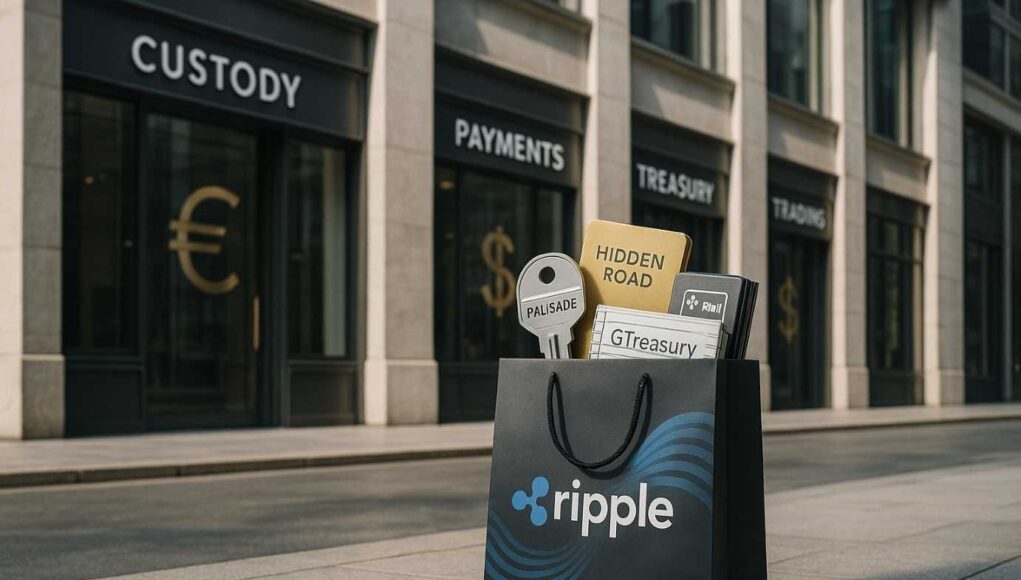TL;DR
- Ripple acquires Palisade Financial SAS, a France-licensed custody firm (AMF registration E2023-082), to strengthen its institutional crypto infrastructure.
- The deal extends Ripple’s 2025 $4 billion investment spree, adding regulated custody to its payments and trading platforms.
- Palisade’s French license gives Ripple immediate EU market access ahead of MiCA’s full enforcement, expanding its regulated footprint across the U.S. and Europe.
Ripple has finalized yet another acquisition, adding the wallet-as-a-service custody provider Palisade to its growing suite of institutional crypto solutions. The move strengthens Ripple’s position in institutional custody and extends its payments and trading infrastructure into a fully integrated stack for corporates, fintechs, and crypto-native firms.
From payments to prime trading
The acquisition marks another step in Ripple’s shift from pure payments processor to regulated financial infrastructure group. Palisade’s wallet-management software and secure custody APIs will plug directly into the Ripple payments platform. This will enable enterprises to move and store digital assets within a single ecosystem. Together with Ripple Prime, the company’s recently launched U.S. OTC brokerage, the integration completes a three-layer model: Payments → Custody → Trading, designed to serve the real-time settlement and liquidity needs of institutional clients.
Palisade, founded in the U.K., specializes in multi-asset wallet orchestration and key-management systems for banks and digital-asset service providers. Ripple said the deal will allow customers to choose between self-custody and managed-custody options through a single interface.
A $4 billion investment streak
Ripple’s Palisade acquisition caps an aggressive 2025 buying spree that has already cost the company roughly $4 billion in disclosed and estimated transactions. Earlier deals included Hidden Road (prime brokerage, ≈ $1.25 billion), Rail (stablecoin infrastructure, ≈ $200 million), and GTreasury (corporate treasury platform, ≈ $1 billion). With Palisade added to the mix, analysts now refer to the group collectively as Ripple’s “institutional four.”
According to multiple industry reports, these investments signal Ripple’s decisive strategy to internalize every piece of infrastructure needed for large-scale digital-asset operations, from issuance and payments to custody and trading. For Ripple, each deal widens its regulatory perimeter and deepens its enterprise moat.
Building a regulated footprint in Europe
Palisade brings a crucial licensing advantage. The firm operates under a French digital-asset custody license issued by the Autorité des marchés financiers (AMF). Hence, Ripple can offer fully regulated custody services across Europe. This license complements Ripple Prime’s U.S. registration and establishes a strong foundation for dual-region compliance. That’s a critical feature for corporate treasurers managing multi-jurisdictional asset flows.
With a London headquarters and French authorization, Palisade acts as Ripple’s bridgehead for European institutional clients seeking compliant storage and settlement solutions. The acquisition enhances Ripple’s ability to provide real-time payment and custody services in euros and other local currencies, building on the EU’s Markets in Crypto-Assets (MiCA) framework, which has been legally in effect since late 2024.
Why custody matters now
Demand for enterprise digital-asset custody has surged as tokenization projects and spot-ETF inflows push institutions to hold crypto on balance sheets. Custody now sits at the center of every major infrastructure strategy, from Fireblocks and Anchorage Digital to Galaxy Digital. Ripple’s latest move brings it into direct competition with these incumbents.
What differentiates Ripple is its integrated architecture. By combining settlement rails, liquidity management, and custody technology, Ripple promises lower friction for banks and corporates moving between fiat and tokenized assets. The Ripple Palisade acquisition reinforces this value proposition by tightening operational control across every transaction layer.
Integration outlook
Ripple plans to merge Palisade’s infrastructure into Ripple Custody by early 2026, followed by unified dashboards connecting the Ripple Payments Platform, custody, and the Ripple Prime trading platform. The company says new APIs will eventually allow fintechs and treasury systems to plug directly into Ripple’s network for instant, compliant asset transfers.
This roadmap aligns with Ripple’s broader goal: transition from transactional revenue to infrastructure economics. Earn recurring fees on custody, settlement, and liquidity provisioning rather than one-off payment volumes.
Institutional positioning and competitive edge
As global financial institutions ramp up pilots for tokenized deposits and real-world-asset programs, Ripple’s infrastructure focus appears well-timed. In fact, its multi-jurisdictional compliance, bank-grade custody, and high-speed payment stack present an appealing turnkey alternative to fragmented service providers.
Market observers note that few crypto firms possess comparable regulatory breadth: U.S. registration through Prime, EU authorization via Palisade, and strategic stablecoin rails through Rail’s RLUSD infrastructure. Each layer reinforces the others, creating a self-contained loop for institutional capital flows.
Closing view
Ripple’s Palisade acquisition underscores how far the company has evolved since its legal battles with U.S. regulators. With four major deals in a single year and billions committed to infrastructure, Ripple is cementing itself as a regulated bridge between traditional finance and on-chain liquidity.
By integrating custody, payments, and trading under one roof, Ripple is no longer just facilitating blockchain transfers. It’s building the rails for the next generation of institutional money movement.
Readers’ frequently asked questions
What services will Ripple gain from the Palisade acquisition?
Ripple will acquire Palisade’s wallet-as-a-service and institutional custody infrastructure. This allows Ripple to expand its offerings beyond payments to include secure digital-asset storage, key management, and API-based integrations for fintechs, corporates, and financial institutions.
How does Palisade’s French AMF license benefit Ripple?
Palisade is licensed by France’s Autorité des marchés financiers (AMF) as a Digital Asset Service Provider (registration no. E2023-082). This gives Ripple immediate access to a regulated European custody framework, aligning with the EU’s MiCA rules and enabling fully compliant crypto-asset services across Europe.
Why is regulatory coverage so important for Ripple’s institutional clients?
Institutional investors can only use custody and payment providers operating under clear regulatory oversight. By combining U.S. and French licences, Ripple can offer compliant services to banks, fintechs, and corporations on both sides of the Atlantic, reducing onboarding and audit friction.
What is in it for you? Action items you might want to consider
Follow Ripple’s expansion into everyday crypto services
Ripple isn’t just about cross-border payments anymore. With the Palisade acquisition, it’s moving into secure storage of digital assets. Keep an eye on how Ripple transforms from a payments company into a full-service crypto provider.
Learn why regulation matters for crypto safety
Palisade is officially licensed in France to safeguard digital assets. That means Ripple’s new custody services must follow strict European rules. Understanding what “regulated custody” means helps readers see why trust and compliance are becoming central to crypto’s future.
Watch how big players shape the next phase of crypto adoption
Ripple’s deal is part of a trend where established firms are building regulated infrastructure for the crypto industry. Following these moves can give readers an early look at how crypto services may soon resemble traditional banking, just faster and more global.










